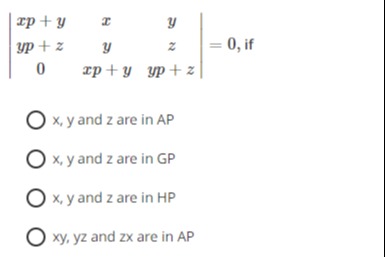Question
Question: $\begin{vmatrix} xp + y & x & y \\ yp + z & y & z \\ 0 & xp + y & yp + z \end{vmatrix}$ = 0, if...
xp+yyp+z0xyxp+yyzyp+z = 0, if

x, y and z are in GP
x, y and z are in AP
x, y and z are in HP
xy, yz, zx are in AP
x, y and z are in GP
Solution
The given determinant is D=xp+yyp+z0xyxp+yyzyp+z Expanding the determinant along the third row: D=0⋅C31−(xp+y)⋅C32+(yp+z)⋅C33 where Cij is the cofactor of the element in the i-th row and j-th column. C31=xyyz=xz−y2 C32=xp+yyp+zyz=(xp+y)z−y(yp+z)=xpz+yz−y2p−yz=xpz−y2p=p(xz−y2) C33=xp+yyp+zxy=(xp+y)y−x(yp+z)=xpy+y2−xyp−xz=y2−xz=−(xz−y2) Substituting these cofactors into the determinant expansion: D=0⋅(xz−y2)−(xp+y)⋅p(xz−y2)+(yp+z)⋅(−(xz−y2)) D=−p(xp+y)(xz−y2)−(yp+z)(xz−y2) Factoring out (xz−y2): D=−(xz−y2)[p(xp+y)+(yp+z)] D=−(xz−y2)[xp2+yp+yp+z] D=−(xz−y2)[xp2+2yp+z] The determinant is equal to zero, i.e., D=0. −(xz−y2)[xp2+2yp+z]=0 This equation holds if either (xz−y2)=0 or [xp2+2yp+z]=0.
The first condition, xz−y2=0, means y2=xz. This is the condition for x,y,z to be in Geometric Progression (GP). If x,y,z are in GP, then y2=xz, which makes the first factor zero, and thus the determinant is zero for any value of p.
The second condition, xp2+2yp+z=0, is a quadratic equation in p. If this equation holds for some value of p, the determinant is zero. However, the options provided are relationships between x,y,z that are independent of p. The question asks for a condition on x,y,z for which the determinant is zero. This suggests that the determinant should be zero based on a relationship between x,y,z that holds for any value of p (for which the expressions are defined). This happens when the factor (xz−y2) is zero.
If x,y,z are in GP, then y2=xz, so xz−y2=0, which makes the determinant zero regardless of the value of p.
Therefore, x, y, and z are in GP.
